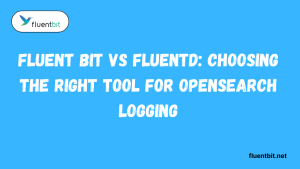Table of Contents
ToggleIntroduction
In the realm of log management, Fluent Bit for Splunk stands out as a powerful lightweight log processor and forwarder. Its functionality extends to seamlessly sending data onward to Splunk, a popular platform for log analysis and visualization. This integration empowers users to centralize and gain valuable insights from their log data.
Fluent Bit: Bridging the Gap Between Log Sources and Splunk
Fluent Bit excels as an intermediary, acting as a bridge between your diverse log sources and Splunk, a central platform for log management and analysis. Here’s a closer look at its key functionalities in this context:
Log Collection Powerhouse:
Fluent Bit demonstrates remarkable versatility by gathering logs from a wide range of sources. This encompasses application logs, system logs generated during regular operation, and even custom log files tailored to specific needs. By acting as a unified collector, Fluent Bit eliminates the need to manage multiple tools for different log types.
Expert Log Parsing:
Once logs are collected, Fluent Bit steps in as an expert parser. It efficiently extracts the crucial information from the collected logs. This process involves breaking down the logs into a structured format, making it easier to understand and analyze the data they contain. Fluent Bit’s parsing capabilities ensure that relevant details are extracted and prepared for further processing.
Seamless Forwarding to Splunk:
After the log parsing stage, Fluent Bit takes the transformed data and transmits it to Splunk. The logs are forwarded in a format that Splunk can readily understand and process for in-depth analysis. This streamlined data flow empowers Splunk to leverage the collected information for tasks like identifying trends, troubleshooting issues, and generating security insights.

Unlocking the Advantages of Fluent Bit for Splunk Integration
The strategic integration of FluentBit with Splunk unlocks a treasure trove of benefits, transforming log management into a streamlined and insightful process. Here’s a detailed exploration of the key advantages:
Centralized Hub for Log Management:
Prior to Fluent Bit, managing logs from a multitude of sources could be a cumbersome task. Fortunately, Fluent Bit acts as a centralizing force. It gathers logs from diverse sources, such as applications, systems, and custom files, and delivers them to Splunk. This consolidated approach eliminates the need to juggle multiple tools and simplifies the process of analyzing all your log data within a single platform – Splunk.
Lightweight Champion:
Unlike some resource-intensive logging solutions, Fluent Bit is a champion of efficiency. It boasts a remarkably small footprint, consuming minimal resources on your system. This makes it an ideal choice for environments with limited memory or processing power. The lightweight nature of Fluent Bit ensures smooth operation without bogging down your system’s performance.
Flexibility Reigns Supreme:
Real-world log data often comes in various formats, each with its own structure. Fluent Bit tackles this challenge head-on with its exceptional flexibility. It offers support for a wide range of log formats, ensuring compatibility with a vast array of log sources. Furthermore, Fluent Bit empowers you to configure it to manipulate logs before they are sent to Splunk. This pre-processing capability allows you to enrich logs with additional data or filter out irrelevant information, ultimately delivering highly focused and valuable data to Splunk for analysis.
Tailoring the Flow: Fluent Bit Configuration for Splunk
Fluent Bit’s configuration files are the cornerstones that dictate how logs are processed and ultimately forwarded to Splunk. These files provide granular control over the data flow, allowing you to tailor it to your specific requirements.
- Splunk Output Plugin: The Bridge Builder: The linchpin for sending logs to Splunk lies in the Splunk output plugin. This plugin seamlessly integrates with Splunk’s HTTP Event Collector (HEC), establishing a reliable communication channel for data transmission. Through configuration, you can specify the Splunk instance’s hostname, port, and authentication token to ensure secure and authorized data delivery.
- Customization Reigns Supreme: Fluent Bit’s configuration empowers you to exert a high degree of control over how logs are delivered to Splunk. Here’s a breakdown of some key customization options:
- Target Index: Splunk utilizes indexes to categorize and organize log data. Using the configuration, you can designate the specific Splunk index where your logs will be deposited. This allows you to segregate logs based on application, source, or any other relevant criteria.
- Event Metadata: Adding Context: Event metadata acts as crucial contextual information attached to each log message. The configuration allows you to define essential metadata fields such as hostname, source (application or system that generated the log), and timestamp. This enriched data provides valuable insights during log analysis within Splunk.
- Raw or Refined? Pre-processing Options: Fluent Bit offers the flexibility to choose between sending raw log data or applying pre-processing steps before forwarding the logs to Splunk. Pre-processing can involve tasks like filtering out irrelevant information, enriching logs with additional data, or reformatting the logs for optimal analysis in Splunk. This ability to manipulate logs before transmission empowers you to deliver highly focused and valuable data to Splunk.
Conclusion
Fluent Bit emerges as a compelling solution for bridging the gap between your diverse log sources and Splunk, the central hub for log analysis. Its ability to collect, parse, and forward logs in a streamlined manner paves the way for efficient and insightful log management.
The lightweight nature of Fluent Bit minimizes resource consumption, making it ideal for environments with limited resources. Furthermore, its exceptional flexibility empowers you to handle various log formats and tailor the data flow through pre-processing steps. By leveraging configuration files, you can exert granular control over how logs are delivered to Splunk, including target indexes, event metadata, and the manipulation of log data before transmission.
In conclusion, the strategic integration of Fluent Bit with Splunk unlocks a powerful combination for streamlined log management. This empowers you to centralize logs from disparate sources, gain valuable insights from your data, and ultimately optimize your overall logging and analysis processes.
FAQs
1. Is Fluent Bit for Splunk compatible with all versions of Splunk?
Fluent Bit for Splunk is designed to be compatible with most versions of Splunk, including Splunk Enterprise and Splunk Cloud. However, it’s always recommended to check the compatibility matrix provided by both Fluent Bit and Splunk to ensure compatibility with specific versions.
2. How do I set up Fluent Bit to forward logs to Splunk?
Setting up Fluent Bit to forward logs to Splunk involves configuring Fluent Bit to use the Splunk output plugin and specifying the necessary parameters such as the Splunk server address, port, and authentication credentials. Detailed instructions for configuring Fluent Bit for Splunk can typically be found in the documentation provided by both Fluent Bit and Splunk.
3. Can Fluent Bit for Splunk handle structured log data?
Yes, Fluent Bit supports the processing and forwarding of structured log data in various formats such as JSON, making it suitable for handling both structured and unstructured log data when forwarding to Splunk.
4. Is Fluent Bit for Splunk suitable for large-scale deployments?
Yes, Fluent Bit for Splunk is designed to be scalable and can be deployed in large-scale environments where there is a need to ingest and analyze vast amounts of log data efficiently. However, proper sizing and configuration of the Fluent Bit deployment are necessary to ensure optimal performance in large-scale deployments.
5. Are there any security considerations when using Fluent Bit for Splunk?
Security considerations include ensuring secure communication between Fluent Bit and Splunk by using protocols such as TLS/SSL, as well as implementing appropriate access controls and authentication mechanisms to protect sensitive log data during transmission.
6. Where can I find additional support and resources for Fluent Bit for Splunk?
Users can typically find documentation, tutorials, and community support forums provided by both Fluent Bit and Splunk. Additionally, official support channels offered by the respective companies can assist users with any technical issues or inquiries related to deploying and configuring Fluent Bit for Splunk.
Latest Post:
- Best Practices for Fluent Bit Output Matching in Complex Pipelines
- Setting Up Fluent Bit with Open Telemetry for Unified Observability
- Fluent Bit vs Fluentd: Choosing the Right Tool for OpenSearch Logging
- How to Use fluent-plugin-opensearch for Fluentd Pipelines
- Is Ansys Fluent Better for Complex Fluid Flow Simulations?












